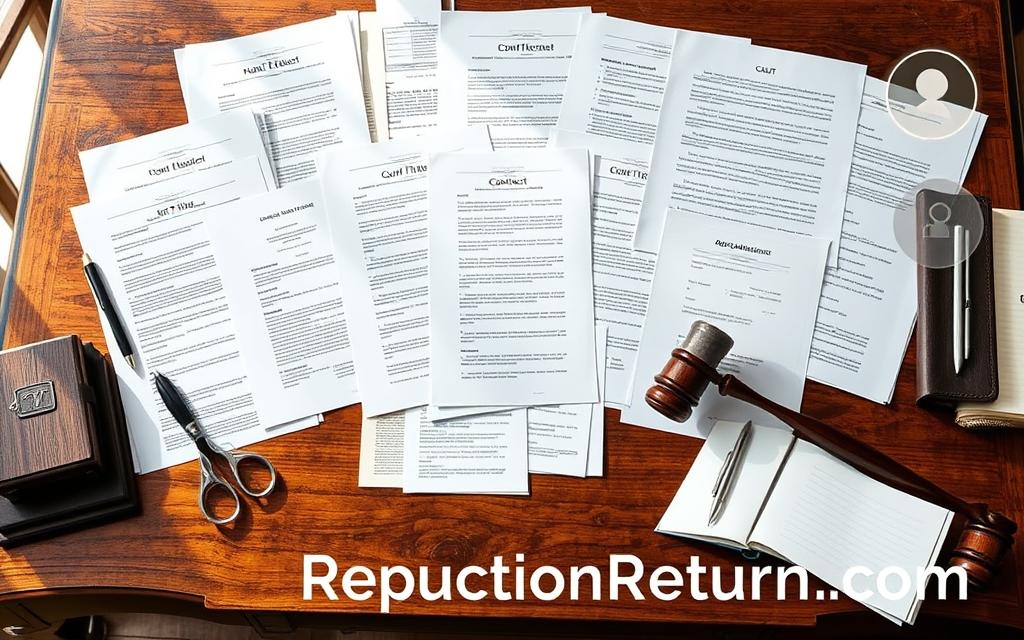Keeping your online life private is key, especially with sensitive legal documents. Today, it’s easy to find public court records online through government sites, court websites, and search engines. But, sharing personal info like names, addresses, and social security numbers can be a big privacy issue.
This article will show you how to keep legal documents from showing up in search results. We’ll cover removing content and using online reputation management services. These steps will help you control your online image and handle your legal records safely.
By learning about the legal side and using smart strategies, you can keep your privacy safe. You’ll also protect your professional reputation and avoid the risks of sharing sensitive info online. Let’s explore legal document suppression and find the best ways to keep your info private.
Understanding the Reasons for Suppressing Legal Documents
Court records can become public online because of laws that push for openness. This can lead to big privacy and reputation issues. People can see sensitive info like names and addresses, which can cause identity theft and harassment.
Even records from minor or solved cases can hurt someone’s job reputation. This is a big worry for those in competitive fields or starting a career.
Protecting Privacy and Personal Information
Putting court records online can be a big privacy risk. People can easily find out personal info like names and addresses. This puts folks at risk of identity theft and harassment.
This is especially true for those in sensitive legal situations or with a past of domestic abuse.
Maintaining Professional Reputation and Credibility
Even records from small or solved cases can hurt someone’s professional image. Potential employers or clients might see these records and make wrong assumptions. This can lead to missing out on chances or damage to reputation.
It’s key to know the legal and privacy sides of online court records. Working with lawyers, using tools to remove online info, and keeping an eye on your online presence can help protect your privacy and reputation.
| Reason for Suppressing Legal Documents | Potential Consequences |
|---|---|
| Privacy Concerns | Identity theft, harassment, and other privacy violations |
| Reputational Damage | Missed opportunities, professional credibility issues |
Identifying Where Your Legal Documents are Published
The first step in suppressing legal documents from search engines is to find where they are online. Start by searching your name on Google and checking court websites and public records. It’s key to look at the search results and find where your legal info comes from before you try to remove it.
Justia’s dockets and court filings show not all court records are public. Some are marked “Not for publication,” meaning they can’t be used in other cases. Personal info in public records is also protected under California’s privacy law.
You can ask to block certain court filings from showing up in search results using robots.txt. But, Justia can’t control how long it takes for these links to disappear from search engines.
Legal research can be tough and takes a lot of time. Most legal pros find it hard to figure out the main legal issue. Over 80% struggle with the huge amount of case law and laws they must look through.
To make legal research easier, many legal experts use secondary sources like law journals and practice guides. They also use tools like KeyCite on Westlaw to check if legal sources are trustworthy. This helps them make sure they’re looking at the most reliable information.
Contacting Court Clerk’s Office for Document Removal
If your court records are on official websites, you need to contact the court clerk’s office to hide court records online. You’ll need to send a formal request letter, give case details, and know the laws about sealing or expunging records in your area.
Preparing a Formal Removal Request Letter
Writing a polite and professional letter is key to getting your records removed. Here are steps to follow:
- Collect all case info, like the case number, court location, and dates.
- State why you want your records removed, like privacy or to protect your job reputation.
- Point out laws or rules that support sealing or expunging your records.
- Be ready to provide more documents or evidence if needed.
- Show you’re willing to work with the court clerk’s office.
- Ask for a written confirmation of when your records are removed or sealed.
For a successful request, be professional, detailed, and know the laws and procedures in your area.
| Recording Fees | Amount |
|---|---|
| First Page | $10 |
| Additional Page | $8.50 |
| Lis Pendens First Page | $5 |
| Lis Pendens Additional Page | $4 |
| Copies per Page | $1 |
| Certification | $2 |
Requesting Removal from Third-Party Websites
You might also need to ask third-party websites to remove your legal info. This can be harder because you have to find the websites, get their contact info, and ask for removal one by one. It’s important to keep up with these requests and check if your info is gone from search engines.
Following Up on Removal Requests
Removing your info from people search sites can take a few days. You should check these sites often to make sure your info isn’t back. Sharing less personal info online and checking your social media privacy can also help keep you safe.
Services like Experian can watch for your info on the dark web or in court records. Some states offer programs to protect people from stalkers by giving them a secret mailing address.
| Website | Removal Process | Estimated Timeline |
|---|---|---|
| BeenVerified | Submit removal request through online form | 3-5 business days |
| FamilyTreeNow | Submit removal request through online form | 1-2 weeks |
| Instant Checkmate | Submit removal request through online form | 2-4 weeks |
To keep your legal record suppression techniques working, stay persistent and keep checking your online presence. By following up and monitoring your online info, you can reduce how much of your sensitive info shows up in search results.

Utilizing Online Reputation Management Services
If you need help with hiding legal documents and managing your online image, consider hiring a pro online reputation management company. They take care of everything from finding all your legal info online to working with courts and search engines to remove it.
Experts in online reputation management know how to handle hiding legal documents. They use smart strategies to make your online image better and boost your search engine rankings. They use content creation, SEO, and targeted removal requests to push negative info down or remove it from search results.
- Companies like FixYourName.com are pros at removing online content and managing reputations.
- Removing bad online content involves legal steps like sending Cease and Desist Letters and Takedown Notices.
- Common things they remove include bad Google My Business reviews, mugshots, court records, and negative news articles.
Working with a pro online reputation management service means your legal documents get hidden, and your online image stays safe. They also help create and share good content to make your online presence better and boost your search engine rankings.
Using online reputation management services can really change the game for you. It helps you hide legal documents and keep your online image positive. With their help, you can manage your digital footprint and protect your personal and professional reputation.
suppress legal documents search engines
Keeping legal documents out of search engine results is key for privacy, reputation, and managing websites with varied content. There are several ways to do this, each with its own benefits and drawbacks.
One way is to remove legal documents or court records from the web. You can ask the court clerk to take down certain records or contact sites hosting them. But, this method takes time and might not work, since public records are meant for everyone.
Another choice is to make legal documents on your site private. This stops search engines from showing them. You can also use robots meta tags or tweak your robots.txt file to keep certain pages from being indexed.
The best way to hide legal documents online depends on your situation and the info out there. It’s important to know the pros and cons of each method before acting. This ensures your site shows the right content to search engines and visitors, without hurting your online image.
- Removing content from the internet
- Password-protecting or restricting access to legal documents
- Using robots meta tags and managing robots.txt files
Continuous Monitoring and Maintenance
Keeping your legal documents off search engines is a continuous task. It needs careful watching and upkeep. A good way to keep up is by using Google Alerts for your name and other key terms. This lets you know right away when your info pops up online. Then, you can quickly deal with it and keep your online image in check.
Setting Up Google Alerts
Google Alerts is a free tool that emails you when new content related to your search terms shows up on Google. Here’s how to set alerts for your name and other key terms:
- Go to google.com/alerts
- Enter the search terms you want to keep an eye on, like your full name and other important keywords
- Adjust the alert settings, such as how often you get updates, what sources to look at, and the email for alerts
- Click “Create Alert” to start getting notifications
With these alerts, you’ll know right away if your legal info shows up online. This lets you act fast to keep your online life under your control.
It’s key to keep a close watch and follow up to make sure your legal document hiding works well over time. Always be on the lookout for new mentions of your info online. This way, you can keep your privacy safe and your professional image strong.
Legal Protections and Limitations for Court Records
Understanding legal protections and limits for court records is key. Some people can seal or expunge their court records, hiding them from the public. But, this can change a lot by state and federal laws.
Also, some court records must be open to the public. This can stop you from fully hiding the information. Knowing your rights and the laws in your area is crucial when trying to manage legal records. This knowledge helps you pick the best ways to protect your online reputation.
Courts say search engine results are “subjective” and protected by the First Amendment. This makes it hard to force search engines to remove or change their results. Yet, looking into legal options and knowing the limits is a good start. It helps in managing your online presence and keeping your privacy and professional reputation safe.

